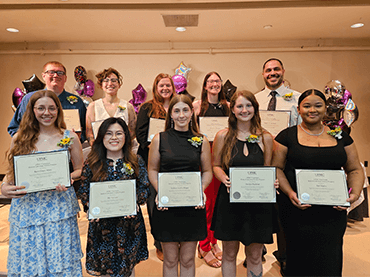This 45-week preceptorship provides a comprehensive curriculum of theoretical knowledge and direct clinical experience in medical laboratory science. The course content and presentation encourages excellence, independence, and confidence in the application of skills, clinical theory, and problem solving within a carefully crafted program which guides students to distinction as highly-qualified, competent, entry-level technologists.
Each course includes the didactic rotation of in-depth lecture series and corresponding student lab sessions, followed by the clinical rotation supplying over 720 hours of direct clinical experience including substantial involvement with instrumentation and quality control, along with direct supervised experience from specimen procurement through result reporting.
The listed course credits are suggested guides and are not awarded by UPMC Chautauqua; refer to the affiliated college/university catalog for the distribution of credits awarded for the following courses.
MLS-1 IMMUNOLOGY / IMMUNOCHEMISTRY (5 Credits)
The didactic rotation covers the theory and principles surrounding the body’s immunological response to disease and the current means of detecting and determining such responses, along with topics in abnormal antibody production as seen in autoimmune diseases and multiple myeloma, and the dynamic field of molecular diagnostics. The clinical rotation allows for direct experience in the numerous serological diagnostic methods, including protein electrophoresis, while building competency in techniques and diagnostic theory.
MLS-2 IMMUNOHEMATOLOGY (BLOOD BANK) (5 Credits)
Coursework in the didactic rotation emphasizes the theory, practice, and diagnostic principles in antibodies and red cell antigens. Topics include blood group systems, hemolytic diseases, and blood donor and recipient transfusion practices. Competency is proven during the clinical rotation with direct bench experience in the intricate procedures and techniques of transfusion medicine, blood component therapy, and the application of immunohematology problem solving.
MLS-3 HEMATOLOGY / COAGULATION (6 Credits)
The study of the cellular and formed elements of blood, body fluids, and the blood-forming tissues and their relation to the diagnostic care of patients as correlated with the entire clinical condition are covered in the didactic rotation. Theory and practice of hemostasis and fibrinolytic pathways are also covered in depth. During the clinical rotation, competency is met through direct experience with specialized instrumentation and manual methods utilized to study cellular morphology, physiology, and pathology, including extensive experience in the differential analysis of microscopic smears of a wide variety of disease abnormalities.
MLS-4 CHEMISTRY / INSTRUMENTATION (6 Credits)
The didactic rotation focuses on the study of analytical chemistry and qualitative analysis of human blood and body fluids stressing the chemistry of proteins, lipids, carbohydrates, vitamins, enzymes, hormones, and more, and their correlation with states of health and disease. Additional topics include applicable principles of quality control, statistical analysis, and laboratory mathematics, along with therapeutic drug monitoring and detecting drugs of abuse. Direct, hands-on experience with the sophisticated instrumentation in the clinical rotation complements the learned knowledgebase through applying the theory of disease to real-time patient results while gaining direct experience in troubleshooting pre-analytical and analytical findings.
MLS-5 URINALYSIS (1 Credit)
Coursework during the didactic rotation considers the anatomy and physiology of the urinary system along with the physical, chemical, and microscopic properties of normal and abnormal urines. Kidney function analysis rounds out the creation of the clinical picture. During the clinical rotation, experience with manual and automated methodologies further builds competency in urinalysis as results are utilized for clinical disease evaluation.
MLS-6 MICROBIOLOGY (7 Credits)
The didactic rotation covers the study of significant microorganisms recovered in clinical specimens through the principles of bacteriology, mycology, mycobacteriology, virology, and parasitology, along with an introduction to microbiology laboratory skills. The direct clinical experience within the clinical rotation sets high competency standards as microbiological techniques and procedures for culture, isolation, staining, identification, and antimicrobial susceptibility of pathogenic microorganisms are stressed. This clinical rotation includes significant experience in molecular diagnostics with both automated and semi-automated molecular genetic techniques in the diagnosis of disease.
MLS-7 SPECIAL STUDIES (2 Credits)
This combines several segments of instruction:
- Orientation: Orientation is designed to allow the student to become comfortable in the professional environment and acquainted with the laboratory staff and clinical routine. Lectures in safety, universal precautions, conduct, academic success, and introductory lectures in fundamental procedures are included.
- Phlebotomy: Instruction in the theory of specimen procurement including patient identification, proper tube/anticoagulant selection, specimen transport, sample processing and more. Ample practice in venipunctures is provided throughout the program year. Students are required to perform procedures on and submit to venipunctures by instructors and fellow students.
- Pathology/Histology: One-on-one personal experience with the laboratory pathologist(s) focusing on his/her role in the guidance and decisions of the laboratory and in the diagnosis of disease, including specimen gross examination, histological techniques, and double-scope slide examination.
- Etcetera Program: Lecture topics in management and supervision, laboratory operations, medical ethics, licensure and regulatory compliance, education methodologies, and more, culminate with the completion of a self-study research portfolio. The portfolio includes optional and required projects allowing a student to select his/her own project grade based on the number and quality of completed options. The multiple choices for optional projects include keeping a trouble-shooting journal, participating in proficiency testing, presenting a patient case study, providing laboratory or nursing in-service training, and more. The major required projects include the completion of a build-a-lab project entitled Laboratory Apprentice, and the completion a capstone research project involving a validation or parallel study (laboratory instrumentation- or kit- or procedure-based) or a quality assurance/improvement study culminating in a poster presentation of research results.


















